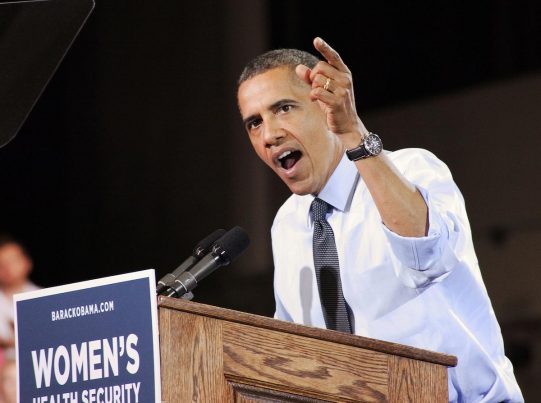
Is Obama holding the military hostage in order to boost domestic spending?
Thursday, October 29, 2015 by usafeaturesmedia
http://www.nationalsecurity.news/2015-10-29-is-obama-holding-the-military-hostage-in-order-to-boost-domestic-spending

(NationalSecurity.news) During his final year in office, President Obama is pushing to bolster spending on domestic programs and entitlements – something the nation can ill-afford without major tax increases, given the massive (and growing) U.S. debt – and he plans to hold the military hostage in the process, The Wall Street Journal reported Wednesday.
“President Obama is determined to end his second term in another blaze of spending glory, and toward that end he’s taking the U.S. military hostage,” the paper reported. “That’s the way to understand his threat to veto the National Defense Authorization Act.”
In an act of bipartisanship – something increasingly rare in today’s Washington, D.C. – the House and the Senate recently passed the annual defense spending measure, achieving important majorities in both chambers in the process; the bill has been sent to the president.
Besides directing spending, the NDAA also contains major military reforms while authorizing $612 billion for national defense, though the money would have to be appropriated separately.
Bucking the sequestration trend of late, lawmakers sent Obama an NDAA that contained his requested $38 billion increase above current federal military spending caps; the measure would achieve this by allocating money through an Overseas Contingency Operations (OCO) fund, which is not subject to sequestration caps, the WSJ noted.
Obama has called that a budget gimmick – and he’s right – but that has not stopped him from requesting his own OCO funds when it suits him politically. The major point is this: The additional $38 billion is money that the president requested and, as it happens, the military needs.
But that’s not good enough. Obama is looking to break the Republican congressional majority’s caps on non-military domestic spending, something they have been loath to do (and rightfully so, given that, despite record tax receipts this year, Uncle Sam is still on par to spend about $490 billion more than he took in). So the president has threatened to veto the hugely bipartisan defense bill, explaining that he will not “fix defense without fixing non-defense spending.”
So in essence, the WSJ reported, “he admits that he’s willing to squeeze a military that is fighting the likes of Islamic State unless he gets more for Head Start, ‘job training and employment services’ and welfare programs.”
- Have you ‘liked’ NationalSecurity.news on Facebook? Click here!
The WSJ further notes:
This intransigence risks derailing vital Pentagon reforms. The NDAA includes Senate Armed Services Chairman John McCain’s sweeping overhaul of Defense’s bloated and sluggish acquisition process. The reforms would give the four heads of the armed services more control over their weapons programs—an idea pushed by former Army Chief of Staff Ray Odierno. It would give the Pentagon new tools to speed weapons from development to the battlefield, and allow specific units, such as Cyber Command, to roll out technology with fewer bureaucratic roadblocks.
It would also allow Defense to purchase commercial items (say, laptops) from nondefense contractors like Apple, and encourage Silicon Valley to do more to meet U.S. defense needs. The goal is to promote more competition in defense contracting.
The NDAA also contains a historic revamp of military retirement. The Pentagon currently has an all-or-nothing program in which troops qualify for retirement benefits only after 20 years of service. Some 83% of those who serve receive nothing for retirement. The NDAA creates a new 401(k)-style plan that would provide even troops who serve as little as two years with some retirement savings. The program would provide an automatic payout of 1% of base pay, and matching federal funds up to 5% for individual contributions.
The bill contains other important provisions, including funds to provide military aide to Ukraine in its defense against Russian separatists, new money for ballistic missile defense, and a military pay raise.
It’s also important to note that critics of sequestration have pointed out that less money has meant longer acquisition times for vital next-gen weapons systems – lag time that has meant the U.S. military’s potential adversaries are dramatically closing the technology gap.
The Pentagon has been forced to develop a new cost consciousness, spending less money on less complex weapons systems that use more existing or commercial technology, according to recent data collected by DoD Undersecretary for Acquisition Frank Kendall.
“In my view, our new product pipeline is not as robust as it should be at a time when our technological superiority is being seriously challenged by potential adversaries,” Kendall said in his report, which examines the current state of the Pentagon’s multibillion-dollar acquisition establishment – which the NDAA Obama plans to hold up actually reforms.
“I encourage the stakeholders of defense acquisition to examine this report, prior reports, and other data-driven analyses to help guide ongoing discussions and policymaking,” Kendall wrote in his report. “While it is important to continue improving our policies and practices, change for change’s sake isn’t the answer. We should use experience supported by data-driven analysis to help ensure we don’t embrace policy reforms that carry unintended adverse consequences.”
The WSJ noted that only on rare occasions – four – have presidents vetoed NDAA legislation, and even then over specific policy disputes. Ronald Reagan vetoed the 1988 defense authorization bill because it cut funding for missile defense; George W. Bush vetoed the legislation in 2007 over a provision allowing plaintiffs lawyers to freeze Iraqi assets in U.S. banks for use in lawsuits brought by the victims of Saddam Hussein.
The paper further noted that the NDAA has ultimately passed 53 years in a row, making it one of the few truly bipartisan measures. This year, however, Obama has put its passage in doubt, and not because it defunds or otherwise changes current defense programs and policies.
“It’s hard to find a worse example of Washington dysfunction than a Commander in Chief, backed by fellow Democrats, who is willing to punish the military so he can break the little fiscal discipline that Congress has,” the WSJ noted.
**UPDATE: President Obama vetoed the Defense Appropriations bill on Thursday, setting up a fight with Congress. It’s only the fifth bill Obama has vetoed during his tenure.
- What does a hero look like? Check out our “This is a hero” product line at the NationalSecurity.News Commissary now!
See also:
Tagged Under:






